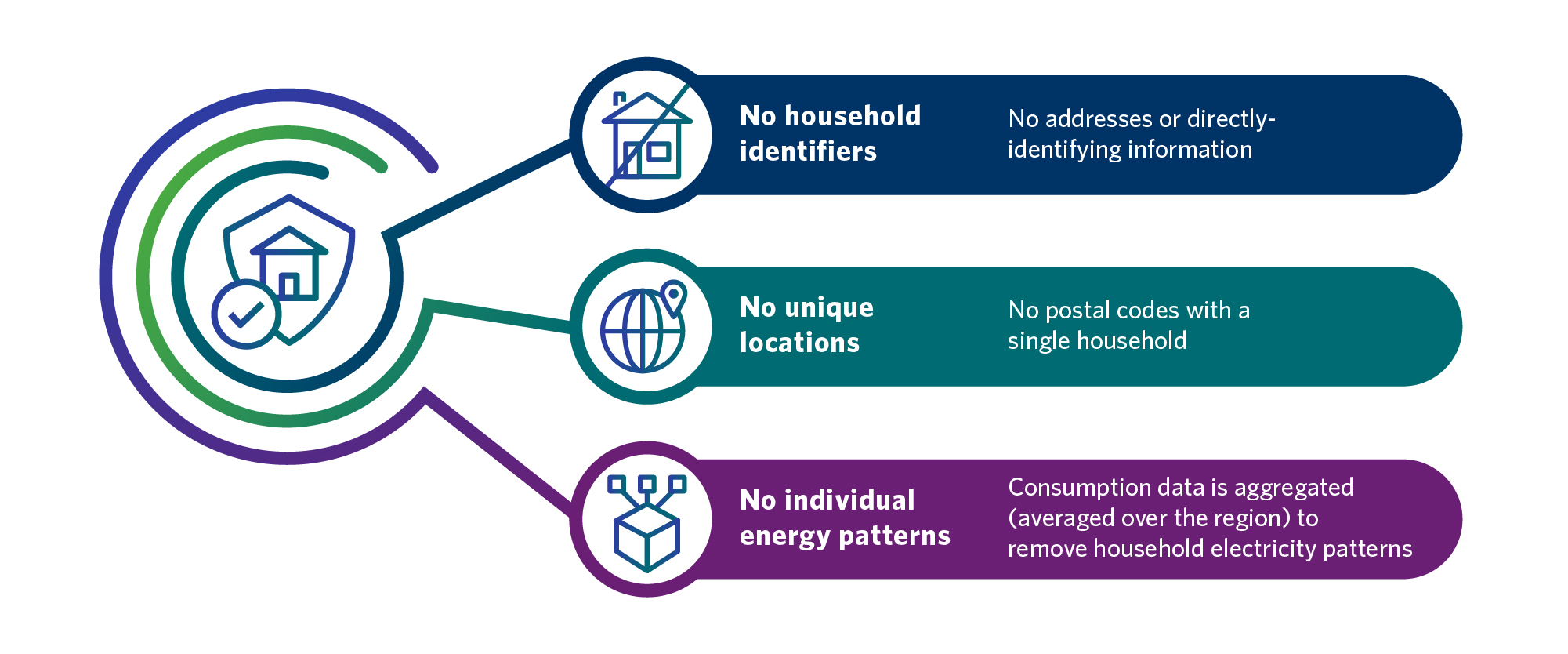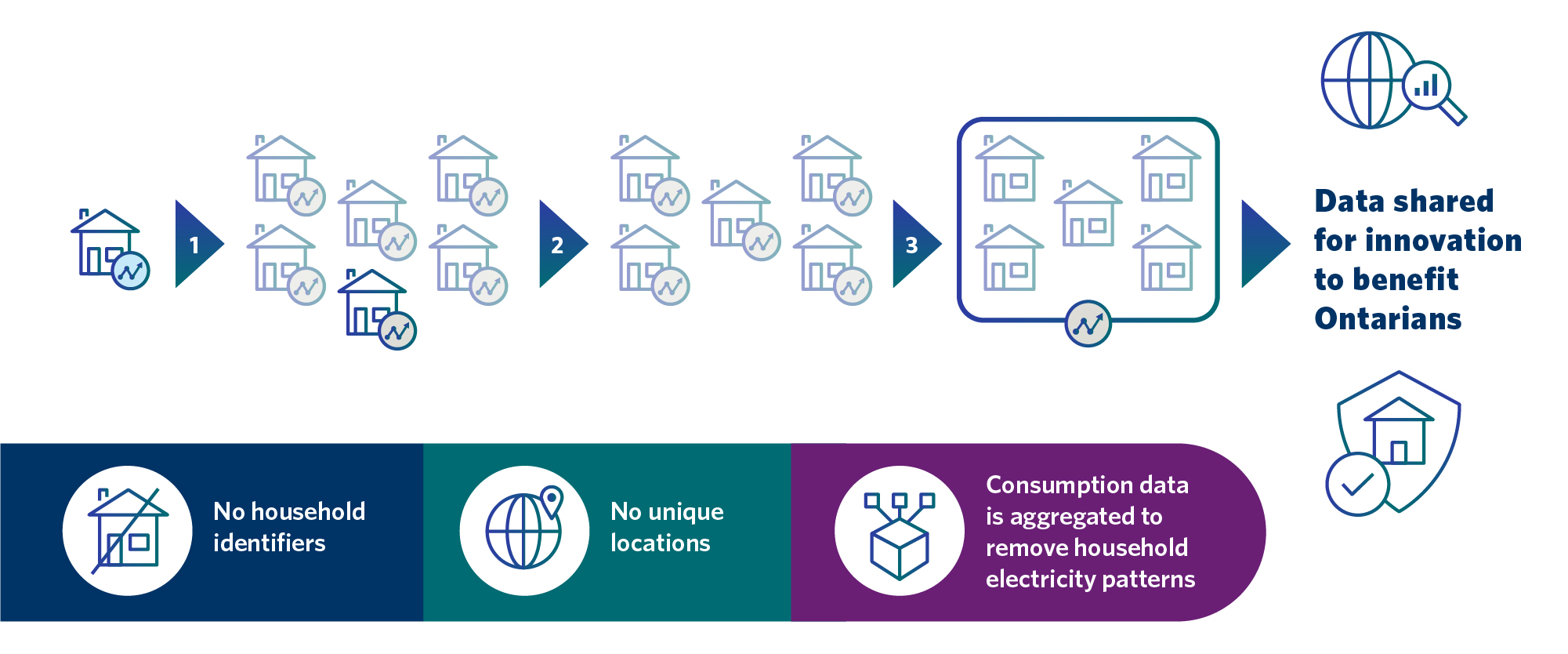Unlocking the value of Ontario's smart meters
Ontario is at the forefront of the smart grid transformation in Canada, with more than five million smart meters installed across the province. Every hour smart meters transmit data to local distribution companies (LDCs) across the province. This data is then uploaded to a central provincial database, making Ontario’s smart meter data repository one of the largest in the world – with over 125 million new records being added each day.
The IESO collects consumption data from residential and small general service (<50 kW) customers and stores it in a central database called the Meter Data Management/Repository (MDM/R). Over the last decade, LDCs have used electricity consumption data collected by smart meters in Ontario to apply time-of-use rates when billing their customers, and since 2021 tiered rates as part of the newly introduced Customer Choice Program. Stakeholders across the province are now recognizing the value of smart meter data to inform policy development, new energy efficiency programs or enhanced community energy planning, among the many potential uses of this data. Following a rigorous consultation process, this has resulted in aggregated smart meter data being available to government agencies and other third parties to develop and launch new initiatives that bring value to Ontario’s ratepayers.
Requests for Smart Meter Data
Smart meter data can be used to help organizations understand the ways in which electricity is used and develop programs, policies and initiatives that benefit Ontario ratepayers. To facilitate that, the IESO provides eligible third-parties with access to de-identified data.
Public Data Sets
The following electricity consumption data is available in the Data Directory under the Demand tab:
- Hourly Electricity Consumption Data – Aggregated by Forward Sortation Area (first three characters of a postal code, or FSA), Customer Type: Residential and Small General Service (<50kW) and price plan (e.g., TOU or tiered).
Non-Public Data Sets
Eligible third parties, defined through a regulatory decision as Canadian governmental entities can access more detailed de-identified smart meter data to inform their work. These entities* include ministries, agencies, boards, commissions, tribunals, wholly-owned corporations, and non-share capital corporations controlled by a federal or provincial government, as well as municipalities (or regional governments), universities, school boards, hospitals and First Nations.
The following information can be requested:
- By postal code – Data can be aggregated by postal code at the number of alphanumeric characters that meets privacy requirements. For example, if an aggregation of premises under a six-character postal code does not contain the minimum number of premises required, the postal code is shortened by one character, or by more if necessary, until the minimum number is reached.
- By type of customer (Distributor Rate Class) – Data can be aggregated for residential and/or small (<50kW) general service customers.
- By price plan (Commodity Rate Class) – Data can be aggregated for customers based on time-of-use, tiered, or other rate options.
*Canadian governmental entities do not include private-sector entities or publicly traded companies, or individual doctors, professors or government officials, or any other entities that are not included in one of the categories outlined above.
Data Privacy and Security
To protect the privacy of Ontarians, the SME does not collect any personal information. Electricity consumption data is de-identified and aggregated before public access is allowed. As the provincial repository for smart meter data, the MDM/R has been developed to meet the internationally recognized principles of Privacy by Design®. All protocols and methodologies applied in the aggregation of data comply with the guidelines set out by the Information and Privacy Commissioner of Ontario.
Three Layers of Privacy Protection

As such, three layers of privacy protection are applied to any data before it is shared:
- Household identifiers are removed (e.g., addresses, account numbers).
- No unique locations are included (e.g., postal codes with only one premise).
- No individual energy consumption is provided (e.g., only the total or average electricity consumption of a group is eligible for sharing).
All Data is Irreversibly Anonymized

All consumption data for Ontario’s electricity customers is stored and protected in the provincial smart meter repository. Before any data is shared with eligible third parties, the IESO applies the following privacy protection measures:
- Aggregation by minimum group size. Only the total or average consumption of electricity consumption for a group of premises is eligible for sharing, and the group must have a minimum number of records hence no individual consumption can be inferred.
- A dominance rule protects the identity of any premises that consumes a disproportionate amount of electricity relative to others in its group. For example, if a very large house exists in the group surrounded by much smaller residences, it could be assumed that most of the consumption comes from that large house, to prevent such identification the large premise is removed from the group.
- A minimum variance rule addresses situations in which there is very little variation in electricity consumption among premises in an aggregated group. In a group where the electricity consumption of the premises is very similar to each other, it may be easier to estimate the electricity consumption of any one premise, therefore the data for this group is not eligible for sharing.
After the measures above have been applied, aggregated smart meter data is considered fully and irreversibly de-identified. In addition, all third parties qualified for receiving non-public data sets are required to sign a Data Use Agreement, which is a legal contract that ensures the data is used for legitimate and ethical purposes, and also enables the IESO to perform post delivery data use audits on such entities.
